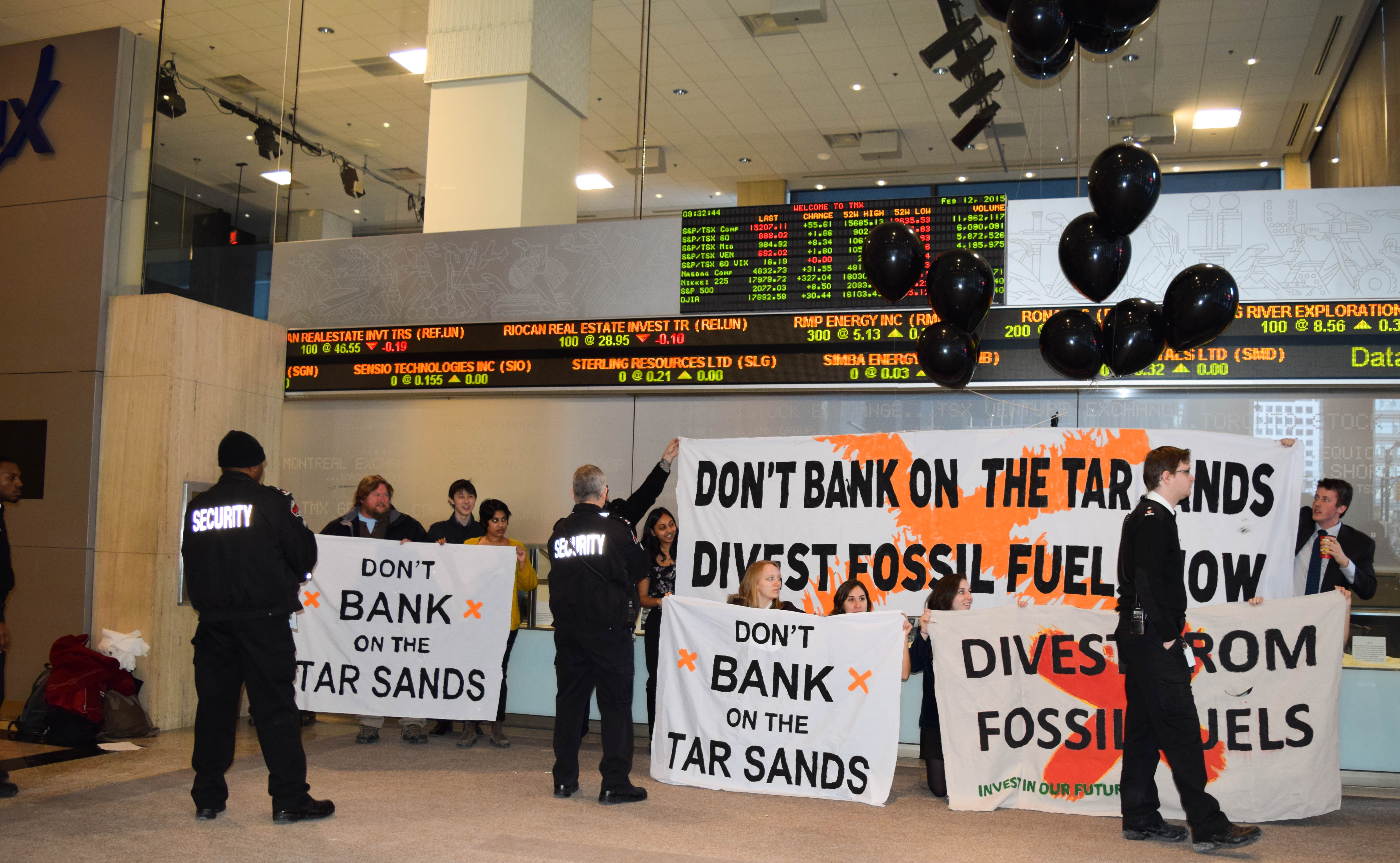Like this article? Chip in to keep stories likes these coming.
Yesterday my friends from Toronto350.org and I raised a banner in front of the Toronto Stock Exchange (TSX) trading board inside the Exchange Tower that read “Don’t Bank on the Tar Sands: Divest Fossil Fuels Now.” The Exchange Tower was locked down after our demonstration.
Toronto350.org is a local organization of climate activists from all walks of life. Our action helped launch 350.org’s Global Divestment Day, happening February 13 and 14. Actions are being held at university campuses and across the country calling for institutions to stop investing in the tar sands and fossil fuels. Our action announced to investors we are here and not going away, and that divesting from tar sands makes sense for three simple reasons.
Tar sands are morally toxic. Canada cannot continue extracting oil from the tar sands and act meaningfully on climate change. Period.
Fossil fuels’ share price is based on the assumption companies will extract every last drop of fossil fuels in their reserves. This amounts to five degrees of global warming — enough warming to cause rampant climate change. Tar sands harm the livelihoods, land and health of Indigenous communities in Alberta, B.C. and along pipeline’s paths. It is no coincidence Indigenous peoples are leading tar sands resistance.
The tar sands are economically toxic. Over $270 billion of tar sands infrastructure projects need oil prices to be more than $95/barrel to break even. Oil prices are now at or below $50/barrel.
Moreover, increasingly strong action on climate change by governments and civil society means only a fraction of fossil fuel companies’ reserves will be burned. Tar sands companies are struggling to move product to market because popular resistance is stopping every pipeline they try to build.
Keystone XL will be rejected and Energy East will be next. Wise investors should reconsider the assumptions built into tar sands developments and get out before everyone else does.
The divestment movement is rapidly growing stronger. We took action yesterday after an incredibly empowering year that saw the largest climate march in history, the landmark Tsilhqot’in Supreme Court ruling that strengthened Indigenous land title, and an enormous climate agreement between the United States and China.
There are now 30+ divestment campaigns in universities across Canada and they are all growing rapidly. Fossil fuel divestment is recognized as the fastest growing divestment movement in history.
The students running many of these campaigns win broad support, with 70+ per cent of students voting favourably towards divestment in UBC and Queens University, and a recent faculty referendum at UBC that will force the Governing Council to consider fossil fuel divestment.
We did this action at the TSX because we feel strong and the fossil fuel industry at long last looks weak.
More and more people who require financial services are joining divestment campaigns. A sensible investor must acknowledge that the students leading divestment campaigns today will soon begin building their pensions.
A growing movement of consumers who refuse to invest in the tar sands has serious consequences for investment and retirement portfolios — it is no longer “business as usual.” The generation that has grown up under an absolute political failure to deal with climate change is choosing to stop giving fossil fuel companies our money whenever and wherever we reasonably can.
The tar sands are not inevitable and Canada’s economy does not depend on them.
The tar sands make up only two per cent of Canada’s economy. The renewable energy sector employs more Canadians than the tar sands. We acted to expose the myth that Canada needs the tar sands.
The tar sands are devastating and are ruining our right to a livable planet. It’s time to divest from them.
Ben DW is Operations Director for Toronto350.org.
Photo: Toronto350.org



